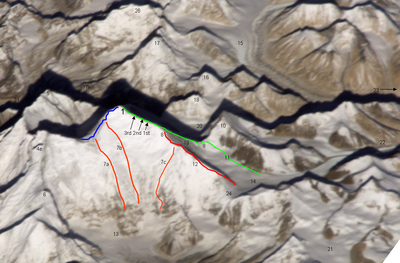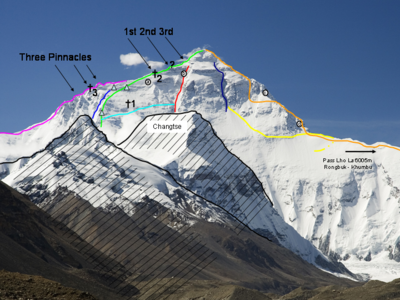Edward Felix Norton
Edward Felix Norton (born February 21, 1884 in San Isidro , Argentina , † November 3, 1954 in Winchester , Hampshire ) was a British army officer and mountaineer .
He was trained at the Charterhouse School and the Royal Military Academy in Woolwich . He joined the artillery of the Indian troops and served in the First World War. He was introduced to mountaineering by his grandfather Alfred Wills in the Alps.

His experience and knowledge allowed him to participate in the British expeditions to Mount Everest in 1922 and 1924 . In 1924 he took over the leadership of the expedition when the original head of Brigadier Charles G. Bruce fell ill and had to leave. Norton reached altitude records in both expeditions, which were only surpassed in 1952 when a Swiss expedition came on the Nepal side to below the southern summit.
| Green line | Normal route, in large parts the Mallory Route 1924, with high camps at approx. 7700 and 8300 m, today's 8300 camp a little more to the west (2 triangles) |
| Red line | Great Couloir or Norton Couloir |
| a) | Point about 8325 m, up to which George Ingle Finch came with oxygen in 1922 |
| b) | Point about 8573 m on the western edge of the couloir, up to which Norton came in 1924 |
Its height of 8,573 m in the “ Norton-Couloir ” later named after him , the steep valley east of the summit pyramid in the north face, was a world record that lasted for almost 30 years. He had reached this height without bottled oxygen, which made him a role model for Reinhold Messner , who took a solo ascent route in 1980 that was close to Norton's preferred wall trusses.
Norton received praise for his achievements high up on the mountain after the disappearance of George Mallory and Andrew Irvine .
Norton later served as an instructor at Staff Colleges in India and England, and commanded the Royal Artillery and later the Madras District in the 1930s. From 1940 to 1941 he was the governor and commander of Hong Kong . He retired in 1942.
Web links
- TG Longstaff (rev. Audrey Salkeld): Norton, Edward Felix (1884-1954) . In: Oxford Dictionary of National Biography , Oxford University Press, 2004
| personal data | |
|---|---|
| SURNAME | Norton, Edward Felix |
| BRIEF DESCRIPTION | British Army officer and climber |
| DATE OF BIRTH | February 21, 1884 |
| PLACE OF BIRTH | San Isidro , Argentina |
| DATE OF DEATH | 3rd November 1954 |
| Place of death | Winchester , Hampshire , United Kingdom |
